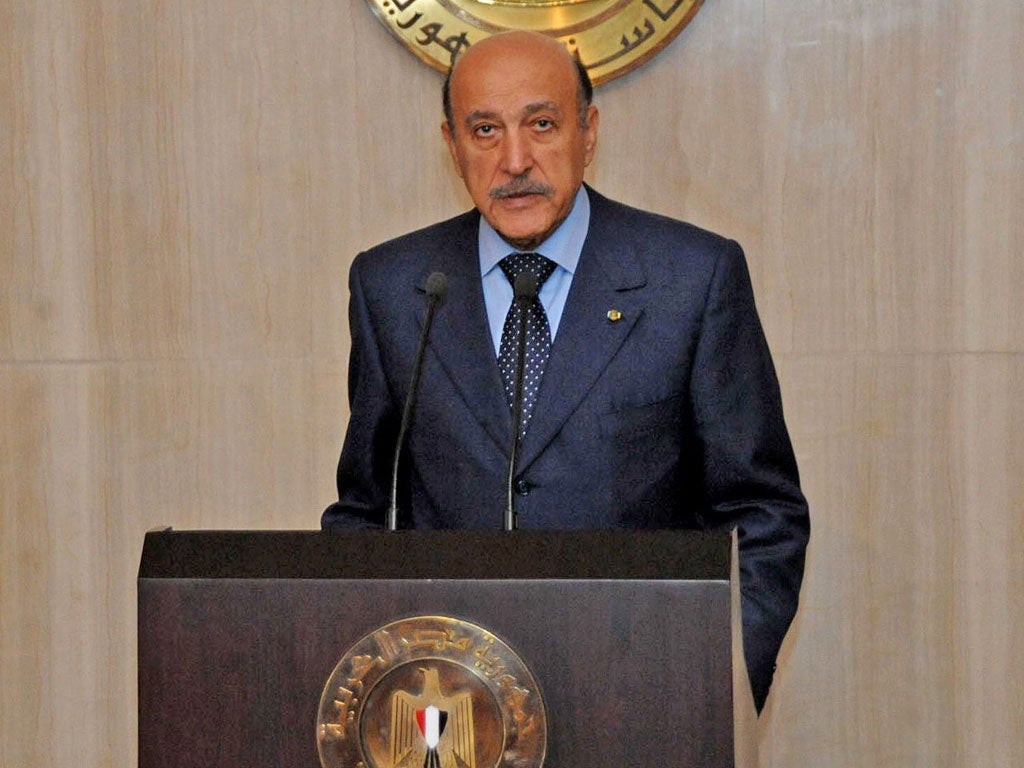Omar Suleiman: Spy chief, politician and stalwart of the Mubarak regime

Your support helps us to tell the story
From reproductive rights to climate change to Big Tech, The Independent is on the ground when the story is developing. Whether it's investigating the financials of Elon Musk's pro-Trump PAC or producing our latest documentary, 'The A Word', which shines a light on the American women fighting for reproductive rights, we know how important it is to parse out the facts from the messaging.
At such a critical moment in US history, we need reporters on the ground. Your donation allows us to keep sending journalists to speak to both sides of the story.
The Independent is trusted by Americans across the entire political spectrum. And unlike many other quality news outlets, we choose not to lock Americans out of our reporting and analysis with paywalls. We believe quality journalism should be available to everyone, paid for by those who can afford it.
Your support makes all the difference.Egypt's former spy chief Omar Suleiman, who died yesterday at the age of 76, was Hosni Mubarak's long-standing éminence grise. He played several crucial roles during Mubarak's 30-year rule; despite his low public profile he had a say in virtually every vital security issue confronting Egypt. Like his boss, he was an enemy of Islamists throughout the region and a friend to the United States and Israel.
Suleiman was appointed vice- president in January last year at the height of the revolution, a failed last-gasp attempt by Mubarak to save his regime. Many protesters were incensed, however, when Suleiman suggested that they were not yet ready for democracy. It was he who grimly appeared on television on 11 February to announce that Mubarak was stepping down and handing power to a military council.
After the revolution, Suleiman disappeared from public view, only to return earlier this year as a presidential candidate, sparking fears of a comeback for the Mubarak regime. However, the election commission disqualified him, along with two Islamist front-runners.
Suleiman said he had decided to run to prevent the Muslim Brotherhood from coming to power. "If the Brotherhood's candidate wins the presidential election, Egypt will be turned into a religious state," he warned. "All state institutions will be controlled by the Brotherhood."
He had been widely believed to be the military leadership's preferred successor to Mubarak. This created unspoken tension between Suleiman and the president's younger son, Gamal, who was seen as being groomed by his father as a rival successor. The uncertainty over the succession, and the fear that Mubarak was trying to set up a family dynasty through his son, helped spark the uprising.
In post-2011 Egypt, Suleiman was seen as tainted by his connections to a president who was sentenced to life imprisonment for failing to stop the killing of protesters during the uprising. Many other key regime figures are in prison pending trials over a catalogue of corruption charges, or have sought exile in Arab countries, Europe or the US.
A tall man who was frequently photographed wearing dark sunglass, Suleiman rarely spoke to the media. He served as intelligence chief for nearly two decades, for most of that time playing a behind-the-scenes role as the leading official in charge of some of the most important issues facing the Egyptian state, including relations with the US, Israel and talks with the Palestinians.
US diplomatic cables posted by WikiLeaks as well as declassified CIA files have identified Suleiman as the principal go-between in US-Egyptian co-operation on counter-terrorism. He is believed to have played a direct role in the US rendition programme, in which suspected terrorists were sent to Egypt and other countries for interrogation, sometimes involving torture.
Omar Suleiman was born in Qena in the south of the country and graduated from military academy as an infantry officer in 1955. He was talent-spotted early on and spent time at the Frunze military academy in the Soviet Union, which was then a close ally of Egypt.He served during the North Yemen Civil War during the 1960s and both the 1967 and 1973 wars with Israel, though precisely what his role was remains a mystery.
He rose through the ranks and was appointed deputy head of military intelligence in 1987 after gaining bachelor's and master's degrees in political science. Fluent in English, it was his role as the go-to man in the critical relationship with the US that fuelled his rise to power. He became head of military intelligence in 1991 during the Gulf War, when Egyptians fought alongside other Arab forces in the US-led coalition that drove Saddam Hussein's army out of Kuwait.
Suleiman indirectly saved Mubarak's life when he advised the former president to take an armoured Mercedes with him on a state visit to Ethiopia in 1995. Mubarak survived an Islamist ambush of his convoy.
Suleiman had been suffering from lung and heart problems and his condition had deteriorated over the past few weeks; he was being treated at a hospital in Cleveland, Ohio, where he died. An urbane, shadowy figure, as one of the autocratic leader's most trusted advisers, he takes some of the fallen government's most closely guarded secrets to his grave.
Chris Maume
Omar Suleiman, army general, politician, diplomat and intelligence officer: born Qena, Egypt 2 July 1936; married (three daughters); died Cleveland, Ohio 19 July 2012.
Subscribe to Independent Premium to bookmark this article
Want to bookmark your favourite articles and stories to read or reference later? Start your Independent Premium subscription today.
Join our commenting forum
Join thought-provoking conversations, follow other Independent readers and see their replies
Comments